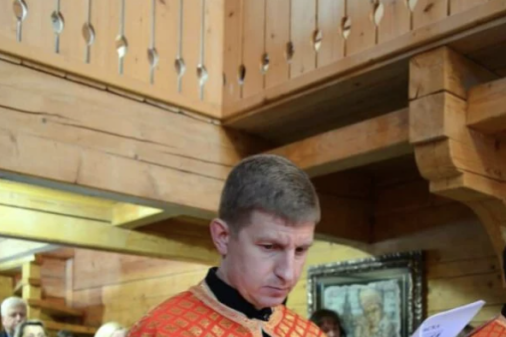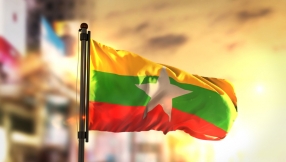
(RNS) — The war in Ukraine has raged on for nearly five months, and the Rev. Oleksiy Zavada, a Greek Catholic priest in Lviv, has had hardly a moment's rest.
Zavada is quick to point out the city of Lviv has been spared the brunt of violence that's ripped through many other parts of the country, especially in the east. But still, life in western Ukraine carries constant reminders of the realities of war on the front lines.
"Many, many, many soldiers in our armies are from the western part of Ukraine," Zavada, the notary of the Curia at the Greek Catholic Archeparchy of Lviv, told Religion News Service on Saturday.
The Greek Catholic tradition is a long-standing, historic strand of Catholicism in Ukraine, whose name comes from the resemblance of its worship services, priestly vestments and use of icons to those of the Greek or Byzantine rites found throughout Orthodox churches worldwide.
Similarly, Greek Catholic priests are permitted to marry and have children. However, the Greek Catholic Church is and has long been under the authority of the pope.
Zavada, a priest of 13 years, also ministers as assistant priest at the Parish of the Ascension of our Lord in the northeast part of the city. He spoke over the phone about the many funerals he's presided over, how the life of the church has changed — and stayed the same — since the war started, and why he plans to stay, no matter how tired he is.
The following conversation has been edited for length and clarity.
We see many priests serving together in images of funerals from Ukraine. Has this always been common in Ukraine, or did it begin during the war?
Normally in Ukraine when a person dies, one priest is present for the funeral service. But when a person dies that played an important role in society, it's normal that many priests come for the funeral. Even priests from different denominations come. As you know, the religious situation in Ukraine is that we have a couple of Orthodox Churches, we have the Roman Catholic Church, we have the Ukrainian Greek Catholic Church, which I belong to.
This tradition, to gather many priests together at a funeral, seems to me to come from (the pro-European protests) in Maidan, in 2014, when many heroes that we call nebesna sotnya (the heavenly hundred) were killed.
The war with Russia began in 2014, not 2022. It seems to me that from that period in 2014, it became a tradition for people to meet the body of a fallen soldier: They go out on the street and they bow down on their knees and they make a live chain.
It's a pity that we have such a tradition, but there it is.
So these funeral practices both among clergy and laypeople are not new —they date from earlier national events — the Maidan uprising, Revolution of Dignity, and Russia's invasion of Crimea and the Donbas in 2014?
Yes, yes. But of course, now, since Feb. 24 (2022), we have many, many more deaths of our soldiers. So this practice is almost everywhere and ongoing.
We have many, many funerals in Lviv. We have one church (Sts. Peter and Paul Garrison Church) — it's a chaplaincy church for soldiers. In this church there are funerals of fallen soldiers very often.
We have videos, photos, these sorts of social networks. So in this way, we can hear sermons during the funerals. You feel that you participate in these funerals, even if you are not present in the building.
Of course some soldiers who are killed, we know (personally). For example, one priest I know, his son was killed a couple of weeks ago - Father Mykhaylo Dymyd, his son, Artem Dymyd, was killed.
You say there are often clergy from many different Christian traditions at funerals. Are there Ukrainian priests from the Moscow Patriarchate who attend these funerals?
I don't know of any such cases — that priests from the Moscow Patriarchate come for funerals. You know, the position of people, of our faithful, of Ukrainians in relation to the Ukrainian Orthodox Church – Moscow Patriarchate, is quite, quite negative. In different regions of Ukraine, the local regional administrations have made decisions to forbid these parishes (under the Moscow Patriarchate) in their regions.
I should say that they (those Ukrainian priests under the Moscow Patriarchate) are trying not to raise their voices. It seems to me they don't know what will be next for their church in Ukraine. But you should understand, and keep in mind, that I'm talking mostly from the perspective of the Ukrainian Greek Catholic Church.
What is the weekly service schedule like during wartime?
Normally for Lviv parishes, we serve liturgies every day. So every day in our parish, we have liturgy, matins, vespers.
So we continue our daily schedule.
But the archeparchy decided, when the war started, to pray day and night. So starting from the end of February, in our parish, for example, we (have) had constant, ongoing prayer day and night. The whole day is divided into one hour (slots). A person is responsible for that hour.
It's not easy, you know. Getting up in the night. But it's our spiritual front.
We call it parish prayer, it's mostly lay people who take responsibility for a concrete hour. (Though also) priests participate in this chain of prayer.
What are some other things the Greek Catholic Archeparchy in Lviv is doing in response to the war?
One of the first archeparchal decisions, in addition to prayer, was that priests should stay in their parishes. Many priests sent their families abroad at the end of February and it seems to me now that many families of priests are abroad. Priests cannot cross the border now, because it's wartime and during wartime many men (are not permitted) to cross the border. Many priests see their family only over the internet.
From the beginning of the war, my family moved to a village near the Polish border. They are still there. And once, every two weeks, I try to visit them. For an American, it's not a big distance - 70-80 km. But for Ukrainians it's quite far. Normally I arrive Sunday in the evening and on Monday afternoon, I depart to Lviv again.
What have you noticed people in your parish struggling with the most during this time of war?
Many of our people are always (consumed) by the news: in social media, Facebook, TV, radio. A person cannot stay, all the time, in the news. So people needed to have some rest. It seems to me they found a short time of peace while in church, in prayer.
Also to do active things, it seems to me, helps our people. For example, women in the parish, they prepare vereniki (traditional Ukrainian dumplings). For them it's like their weekly service. They get together for a couple of hours, they prepare vereniki, some others prepare cakes. We freeze them and we find a way to pass this food to our soldiers. Or to those people who are in need.
These active things — preparing food, cooking, baking — it helps people not to be involved in the news all the time.
Have you noticed more people coming to church during the war?
Many, many people, not only from the north of Ukraine, eastern Ukraine, southern Ukraine, (but also) many people from western Ukraine moved abroad. Especially young people, young families with small children. I very often hear from priests that the number of people who visit church is reduced. And also we should keep in mind, before the war was the pandemic. So we have had different restrictions for liturgical presence and participation.
You describe such a lot going on in Lviv, from constant funerals to constant prayer. Are you tired, Father? How are you feeling?
How am I feeling? It's a difficult question.
Truthfully, I should like to have some rest. (He laughs.) I would like to have a vacation. But I think that for now it's not possible for me. And I say to myself, my situation, as a priest in Ukraine living here in the western part of Ukraine — in comparison to those priests in the north part of Ukraine, or east or south — we are in quite good condition.
During this war we cannot say we are tired. I just compare my situation (to the) situation of those who are under rockets and bombs. For now my conscience says I cannot have rest. I should work. We should work all together. Of course many people say 'I am tired'. But if we say this, we will lose this war. We will have rest after victory.
© Religion News Service













